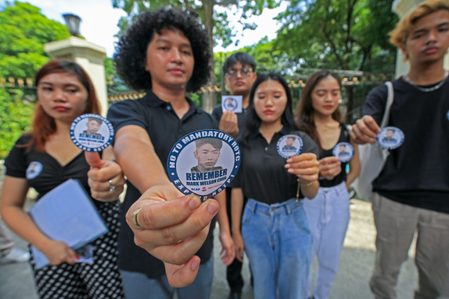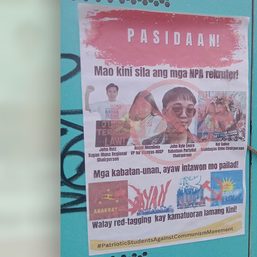SUMMARY
This is AI generated summarization, which may have errors. For context, always refer to the full article.
![[OPINION] Celebrating the achievements of youth human rights defenders in Asia](https://www.rappler.com/tachyon/2023/08/ispeak-youthday.jpg)
In Asia and beyond, young activists receive daily targeted harassment from governments, the police, and private corporations. Why? For tirelessly protecting and promoting human rights.
A notable example would be the “Milk Tea Alliance,” an online movement that has been inspiring a rising number of youth across Asia since 2020. From Hong Kong to Taiwan, Thailand, Myanmar, and beyond, young people are using social media to create organic networks of pro-democracy defenders. They have also peacefully taken their fight for justice and equality offline and into the streets.
Youth defenders in Asia champion various causes such as environmental justice, gender equality, right to education, and freedom of expression, just to name a few. They are initiating conversations that stir collective action and promote innovative ways of activism.
Harassment faced by youth defenders
Examples of youth defenders include students staging a solidarity demonstration against the discriminations faced by religious minorities in India; young demonstrators calling for the end of gender-based harassment in Kazakhstan; and youth environmentalists opposing detrimental mining operations in the Philippines.
Human rights defenders (HRDs) also include groups of people who associate in the form of civil society organizations – whether formally registered or not – to collectively promote democratic values or reforms. Communities can act as HRDs when representing their collective rights and legitimate aspirations as in the case of indigenous groups jointly claiming their ancestral lands and resisting the exploitative actions of businesses.
Unfortunately, the more exposure HRDs receive and the more they achieve, the more harassment they experience. In 2021 and 2022 alone, at least 299 cases were recorded by FORUM-ASIA in which the rights of students and youth defenders were violated, with at least 1,161 defenders affected.
“As a regional human rights organization, it is our task not only to assist HRDs in their work, but also to mainstream their role as agents of change,” said Mary Aileen Diez Bacalso, FORUM-ASIA Executive Director.
Despite experiencing human rights violations in the form of judicial harassment, physical violence, and intimidation, young HRDs are not giving up.
The bravery of youth defenders
Let us recognize the courage exhibited by students and youth defenders.
Take the achievement of 25 Cambodian youth environmental defenders who celebrated the World Environment Day in May 2022 as an example. Together, they led a 600-kilometer cycling campaign from Kampong Thom to Preah Vihear. Throughout the campaign, however, they were questioned and photographed by authorities. While the government asserted that such actions were merely safety measures, the youth defenders felt that they could not speak freely in the authorities’ presence.
In Afghanistan, young women HRDs have never stopped advocating for their fundamental freedoms even after the Taliban takeover in 2021. Despite the Taliban’s attempts to erase women and girls from public spaces – including schools – youth defenders are persistently protesting against repressive laws that take away their basic human rights. In the process, women protestors have been beaten and arrested at Badakhshan University for resisting the Taliban’s decision to ban women from entering the campus when not wearing burqas. The Taliban has also barred women from attending universities, resulting in young Afghan women protesting outside Kabul University.
In Sri Lanka, youth defenders were at the centre of the country’s pro-democracy movement as student activists rose up against the Rajapaksa administration’s bid to militarise academic institutions. Youth defenders played an integral role in the resignation of Rajapaksa. At present, their collective work towards democracy persists despite threats from the authorities. Youth defender Wasantha Mudalige – who was previously detained under the Prevention of Terrorism Act for his activism – commented that the hopes of Sri Lanka’s youth movement is “propeling the society towards a genuine systemic change” beyond a temporary change of politics.
Youth activism goes beyond the personal challenges faced by young people as it is interconnected with larger social movements and all aspects of human rights work. Youth defenders are not only advocating for their rights, but the rights of all.
Let the youth lead
Youth defenders are the future of human rights work. At the same time, they are stepping up as leaders and innovators of today’s social movements.
Students and youth defenders are collaborating with other HRDs to demand and create a more just and equal society for us all.
“Our primary role is to stand unconditionally for the rights of all individuals and fight on their behalf,” said youth defender Mudalige.
We must create a safe and enabling environment for youth defenders, where they can pursue their advocacies free from harassment, both mentally and physically.
Let us ensure that youth defenders can participate in human rights work as equal counterparts. They deserve a seat at the table, their voices need to be amplified, and their stories deserve our full attention.
This is a call not only to governments, civil society, and the international community, but also to the general public. We must help create protection mechanisms for youth defenders. We should give them more opportunities to be involved in activism, encouraging them to proactively engage in enhancing their communities as well as society at large.
Simply put, our future also depends on the success of today’s youth defenders. – Rappler.com
Valerio Loi and Hye-Joon Lee are staff members at FORUM-ASIA and co-authors of Defending in Numbers: Rising Together Against All Odds.
FORUM-ASIA works to strengthen movements for human rights and sustainable development. It has consultative status with the UN Economic and Social Council and a consultative relationship with the ASEAN Intergovernmental Commission on Human Rights. Its Secretariat is based in Bangkok, with offices in Jakarta, Geneva, and Kathmandu.
Add a comment
How does this make you feel?






There are no comments yet. Add your comment to start the conversation.